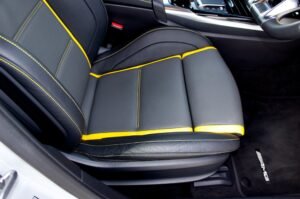It’s winter time and you see a light on your dashboard. Upon checking, you see that it’s your TPMS (Tire Pressure Monitoring System) light. Is there something wrong with your tires? Maybe, maybe not. What you need to keep in mind is that when winter comes, there is a higher probability that your TPMS light would turn on. If you’re wondering why, then this article will explain how it happens and what you can do about it.
What Is TPMS?
TPMS is a system that monitors the air pressure in the tires of a vehicle. It is important because it alerts the driver if the tire pressure is too low, which can improve vehicle safety, fuel efficiency, and tire life. Driving with under-inflated tires can lead to decreased handling, increased tire wear, and can cause tires to fail, potentially leading to a blowout. The TPMS helps ensure that tires are at their optimal pressure, promoting safe and efficient vehicle operation.
Why Does My TPMS Light Turn on When It’s Cold Outside?
The TPMS light turns on due to the decrease in tire pressure when tires are exposed to low temperatures. As the temperature drops, the air inside the tires contracts, causing the pressure to decrease. This decrease in pressure can cause the TPMS light to turn on as a warning that the tires are under-inflated and may affect the vehicle’s handling and fuel efficiency.
Aside from this, the rubber can shrink when temperatures decrease. This results in gaps between the rubber and the rim and these gaps can cause air to escape gradually. It’s also possible that you’re driving with winter tires on your car and they’re not properly inflated.
What Do I Do With My Tires in Winter?
The best way to avoid having any tire problems in the winter is by checking your tire pressure regularly and keeping track of any changes in weather conditions that might affect how much air pressure each tire holds. You should also check all four tires at once; if one has significantly less pressure than another, it could indicate a leak somewhere in either its inner liner or outer casing and require immediate attention from an expert mechanic
Aside from checking your tire pressure, here are additional tips on how to keep your tires in good condition during winter:
- Use winter tires: Winter tires are designed to perform well in cold weather and on snowy or icy roads. They provide better traction and handling than all-season tires.
- Keep your tires properly aligned: Misaligned tires can cause uneven wear and reduce their lifespan. Make sure your wheels are aligned properly and adjust them if necessary.
- Rotate your tires: Regular tire rotation helps distribute wear evenly and extends the life of your tires.
- Avoid overloading your vehicle: Overloading your vehicle can put extra stress on your tires and reduce their lifespan. Make sure to distribute the weight of your vehicle evenly.
- Avoid driving in extreme weather conditions: Driving on snowy or icy roads can be dangerous and put extra stress on your tires. If possible, avoid driving in extreme weather conditions and make sure your vehicle is equipped with winter tires.
- Store your vehicle properly: If you won’t be using your vehicle for an extended period of time, store it in a garage or covered area to protect your tires from the elements.
For most drivers, especially the diligent ones, the TPMS light can be a nuisance. It can be confusing and frustrating to see this light turn on when you know there’s nothing wrong with your tires. If you’re certain that there’s nothing wrong with your tires and you’ve double-checked and triple checked them already, then an option for you is to install a TPMS bypass emulator. When the TPMS bypass emulator is installed, it sends a signal to the computer indicating that the tire pressure is within the normal range which turns off the TPMS light.
It is important to note that TPMS bypass emulators are recommended for use only by responsible drivers who regularly check their tires. If a tire is under-inflated, it can cause poor handling, reduced fuel efficiency, and increased tire wear. It can also lead to a dangerous blowout if the tire is severely under-inflated. Always make sure that your tires are properly inflated and monitored to ensure safe driving conditions. It is your responsibility to keep your tires and your car in good working condition for your own safety as well as the safety of your passengers and other road users.
Is your TPMS light malfunctioning in the winter? Would you like to learn more about the TPMS Tyre Sensors Bypass Emulator to get rid of the TPMS light on your dashboard? Our team is available to address your questions. Call us at +44(0) 77 837 25020 or click here to contact us today!
Royalty-free image supplied from Pexels as part of the SEO service from 3R




0 Comments